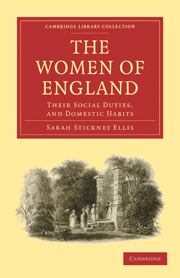Summary
In writing on the subject of modern education, I cannot help entertaining a fear lest some remarks I may in candour feel constrained to make, should be construed into disrespect towards that truly praiseworthy and laborious portion of the community, employed in conducting this education, and pursuing, with laudable endeavours, what is generally believed to be the best method of training up the young women of the present day. Such, however, is the real state of my own sentiments, that I have long been accustomed to consider this class of individuals as not only entitled to the highest pecuniary consideration, but equally so to the first place in society, to the gratitude of their fellow-creatures, and to the respect of mankind in general, who, both as individuals, and as a community, are deeply indebted to them for their indefatigable and often ill-requited services.
A woman of cultivated understanding and correct religious principle, when engaged in the responsible task of educating the rising generation, in reality fills one of the most responsible stations to which a human being can aspire; and nothing can more clearly indicate a low state of public morals than the vulgar disrespect and parsimonious remuneration with which the agents employed in education are sometimes requited.
It is with what is taught, not with those who teach, that I am daring enough to find fault.
- Type
- Chapter
- Information
- The Women of EnglandTheir Social Duties, and Domestic Habits, pp. 59 - 88Publisher: Cambridge University PressPrint publication year: 2010First published in: 1839

